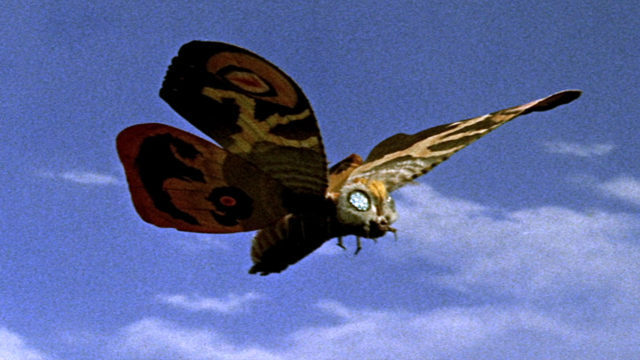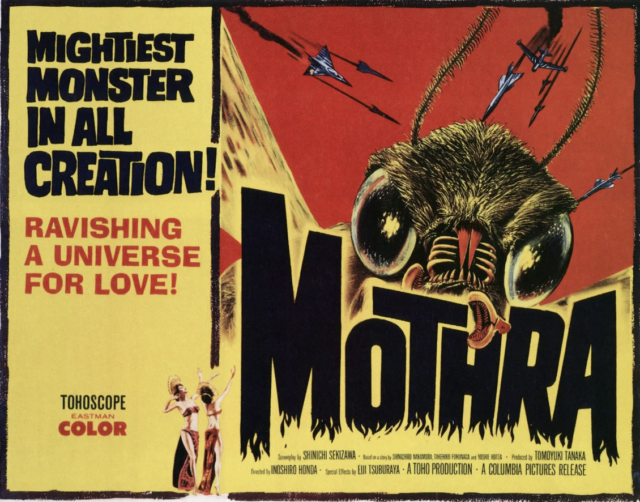
Mothra flies into Japan Society for special screening on July 8
MOTHRA (KAIJU) (Ishirō Honda, 1961)
Japan Society
333 East 47th St. at First Ave.
Friday, July 8, $15, 7:00
www.japansociety.org
Look, up in the sky! It’s a bird! It’s a plane! It’s — well, eventually, it’s a gigantic gynnidomorpha alisman, commonly known as a moth. But first, it’s an enormous caterpillar that moves across Japan slower than the giant breast in Woody Allen’s 1972 Everything You Always Wanted to Know About Sex* But Were Afraid to Ask. And while the mammoth mammary Victor Shakapopulis is hunting down in Allen’s comedy shoots out mother’s milk, the giant lepidoptera, labeled Mothra, dispenses powerful silk.
In the 1950s and ’60s, a series of Japanese films featured monsters born of the aftereffects of the atomic bombs that were dropped on Hiroshima and Nagasaki and the fear of alien invasion. It all started with Ishirō Honda’s Godzilla in 1954 and also included Honda’s Rodan and King Ghidorah and Noriaki Uasa’s Gamera as well as endless sequels.
In 1961, Honda gave us Mothra, a melding of Godzilla — Gojira in Japanese, the last two letters of which were added to the otherwise harmless word “moth” to make it appear much more dangerous — and the basic plot of King Kong. In fact, the next year Honda made King Kong vs. Godzilla.

The tale begins as human life is discovered on Infant Island, where the government of Rolisica (a combination of Russia and America) conducted hydrogen bomb tests thinking the land mass was uninhabitable. A group of explorers is assembled to investigate, led by the evil Rolisican Clark Nelson (Jerry Ito), who has ulterior motives. Among the others on the expedition are Dr. Shin’ichi Chûjô (Hiroshi Koizumi), an anthropologist and linguist who is excited by what might be discovered, and Zen’ichirō Fukuda (Frankie Sakai), a stowaway reporter (and comic relief) who is trying to get the big story for his demanding editor, Sadakatsu Amano (the great Takashi Shimura of Akira Kurosawa fame).
On the island, they discover a pair of “tiny beauties” (identical twins Yumi Ito and Emi Ito of the pop duo the Peanuts) called the Shobijin, singing sisters who are a mere one foot tall. Using weapons against the peaceful indigenous population, Nelson captures the fairies and brings them to Japan to exploit them. The islanders then perform a ritual ceremony to summon a great monster from its shell to bring the women back. “Whatever some giant monster does is completely unrelated with our work,” Nelson’s cohort declares, setting the stage for a final showdown in New Kirk City, a version of New York, Los Angeles, and San Francisco.
Mothra is a bizarrely masterful movie, a warning about the dangers of atomic warfare, government greed, rampant capitalism, and disregard for indigenous societies. Written by Shinichi Sekizawa, who penned dozens of monster flicks, the film is a kind of parable of the human life cycle from birth to death. The Shobijin, two miniature women, are found on the deftly titled Infant Island, and they are almost like children, growing up in front of us as they learn to speak. Mothra evolves from egg to caterpillar to moth. It’s as if the whole world has been reborn in the aftermath of WWII, with Russia and America merging together to try to become the parents of the planet.
The special effects, courtesy of Eiji Tsuburaya, are often hilarious. When Nelson picks up the tiny beauties, it is obvious he is holding two small dolls. It is clear that many of the cars are toys, and the breaking of a dam looks like a kid’s unwieldy science experiment. Pre-CGI superimposition of characters over various locations is shaky. For some reason, the military pauses for what seems like hours while Mothra spins its cocoon. The skin of the actors portraying the indigenous denizens of Infant Island was (poorly) darkened in a way that would be totally unacceptable today (and should have been in 1961).
But then, amid an attack by Japanese planes on Mothra doing the breaststroke across the ocean, an unintended rainbow flashes for just a second, as if the heavens are declaring him our hero and promising that things will turn out okay, a feeling that is echoed in the Peanuts’ haunting, memorable song.
Mothra is screening in 35mm at Japan Society on July 8 at 7:00 and will be introduced by Kevin Derendorf, author of SF: The Japanese Science Fiction Film Encyclopedia and Kaiju for Hipsters: 101 Alternative Giant Monster Movies. In addition, there will be a Kaiju-themed pop-up sponsored by Seismic Toys, with an exclusive limited-edition Mothra Mini-Print by Robo7 on sale in the lobby.